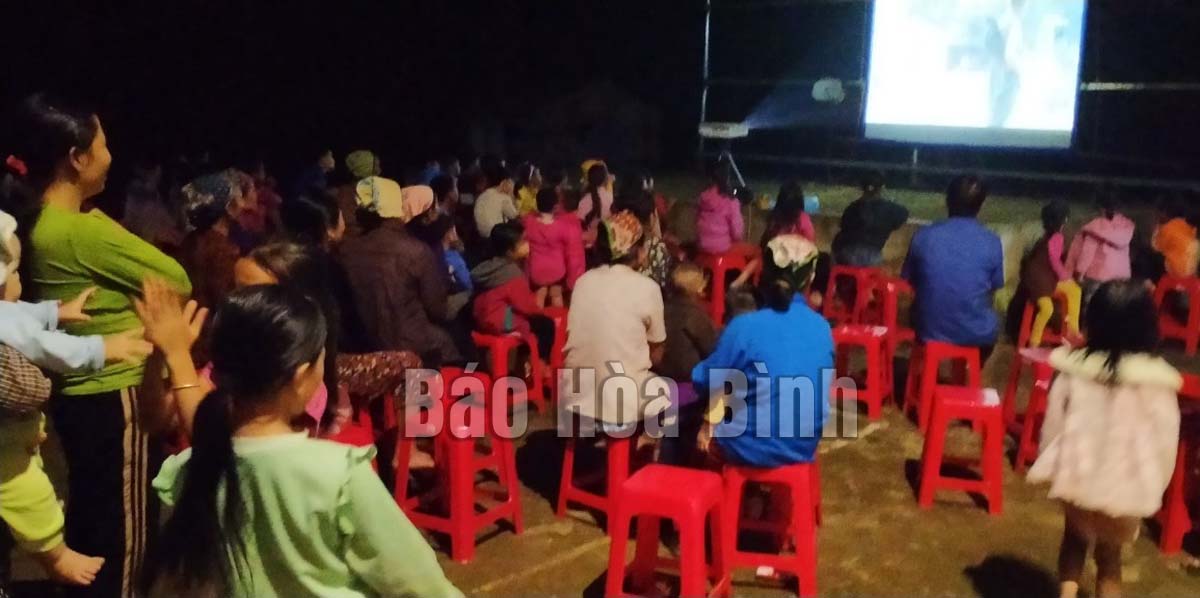
(HBO) – Amid the current information explosion and the rise of the media, entertainment, and social networks, not many people remember the film screening team at a time when TV sets were unavailable. Over the past years, film screening teams have worked to perform the political task of improving spiritual and intellectual lives in remote, mountainous and especially disadvantaged areas.
\Photo: A movie screening session of the team No.1 (the provincial Centre
on Culture-Cinema) in Nang hamlet, Quyet Thang commune, Lac Son district in
2020
The movie screening team No.1 under the
provincial Centre on Culture-Cinema was honoured by the Steering Committee for
Awards on popularisation of literature, arts and journalism themed "Studying
and following t
hought, moral virtues and lifestyle of
President Ho Chi Minh” for its outstanding achievements for the 2018-2020
period. Bach Thanh Tinh, an official from the team said at this time, movies
marking Day of Invalids and Martyrs will be screened. However, due to the
COVID-19 pandemic, the plan has been cancelled.
In January 2019, the provincial Centre on
Culture-Cinema was established with the task of screening films and bringing
culture, artworks and films to residents in remote, mountainous and ethnic
minority areas to disseminate the Party and State’s guidelines and policies to
people, contributing to improving intellectual standards, reducing poverty, and
building a healthy cultural environment, and for the sake of political
stability, socio-economic development and national defence-security
maintenance.
In early 2020 when the COVID-19 pandemic broke
out, there were only 216 film screening sessions serving 12,390 audiences,
mostly history films and documentaries about life and career of President Ho
Chi Minh, and war-themed films released by the Vietnam Cinema Department. The
team also worked with departments, agencies and localities to disseminate laws,
prevent social vices, encourage agriculture and forestry, raise public
awareness of new rural development, and honour outstanding people and good
deeds.
Deputy Director of the centre Do Quoc Cuong said
despite hard working conditions and limited income, members of the team always
encourage each other to uphold the sense of responsibility and fulfill assigned
tasks./.
With an increasingly vibrant and widespread emulation movement aimed at building cultured residential areas and cultured families, Yen Thuy District has been making steady progress toward improving both the material and spiritual well-being of its people, while fostering a civilized, prosperous, beautiful, and progressive community.
Once lacking recreational spaces and community facilities, Residential Group 2 in Quynh Lam Ward (Hoa Binh City) has recently received attention for the construction of a new, spacious, and fully equipped cultural house. The project followed the model of state support combined with public contributions in both labor and funding.
The "All people unite to build cultural life" movement, which has been effectively integrated with Kim Boi district’s socio-economic development goals, is fostering a lively spirit of emulation across local residential areas, hamlets, villages, public agencies, and enterprises. In addition, through the initiative, traditional cultural values are being preserved and promoted, while community solidarity and mutual support in poverty reduction and economic development are being strengthened.
A working delegation of the Hoa Binh provincial People’s Committee led by its Permanent Vice Chairman Nguyen Van Toan on June 11 inspected the progress of a project to build the Mo Muong Cultural Heritage Conservation Space linked to tourism services in Hop Phong commune, Cao Phong district.
Born and growing in the heroic land of Muong Dong, Dinh Thi Kieu Dung, a resident in Bo town of Kim Boi district, in her childhood was nurtured by the sweet lullabies of her grandmother and mother. These melodies deeply imprinted on her soul, becoming an inseparable part of her love for her ethnic group's culture. For over 20 years, this love for her hometown has driven Dung to research, collect, and pass down the cultural values of the Muong people to future generations.
In the final days of May, the Ethnic Art Troupe of Hoa Binh Province organized performances to serve the people in remote, mountainous, and particularly disadvantaged areas within the province. These were not just ordinary artistic shows, but they were the meaningful journeys aimed at spreading cultural values, enhancing the spiritual life of the people and contributing to the preservation of ethnic minority cultural identities.



